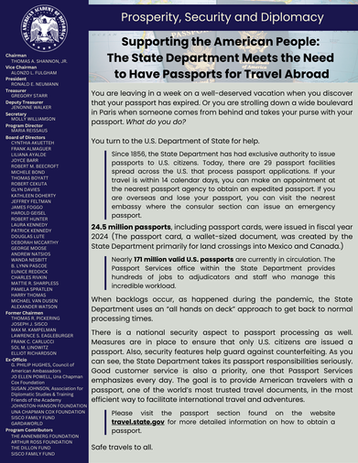US multilateral diplomacy lacks focus and training compared to many other states and yet it is increasingly important in meeting transnational problems. The Academy’s new report argues that in order to deal effectively with the pressing international challenges of global pandemics, climate change, or supply chain problems, the U.S. Department of State “must bring multilateral diplomacy into the mainstream of policymaking, diplomatic practice, and diplomatic training.”
The “Bringing America’s Multilateral Diplomacy into the 21st Century” report takes stock of the present state of America’s multilateral diplomatic arsenal, reviews the best practices of other key global powers, and issues the following set of recommendations for enhancing America’s multilateral diplomacy in the areas of policy, practice, and preparation:
Policy Recommendations:
The State Department and the Administration must make strategic decisions about where U.S. long-term multilateral interests lie and must fully engage in efforts to ensure that the U.S. has the right people in the right places to advocate for U.S. interests and to shape international policy accordingly.
Concurrently, the State Department must build strong relationships with a wider-than-ever range of government agencies and organizations to reassert Department leadership in foreign affairs in the interagency process.
Finally, the President’s letter of instruction to ambassadors should stress the importance of bilateral ambassadors as an essential part of the Administration’s multilateral team, and the Secretary of State should take steps to reinforce that message.
Practice Recommendations:
The State Department should undertake a global staffing review and align human capital and policy priorities. The Department should take steps to counter the real or perceived impact of loss of promotion competitiveness resulting from assignment outside the Department by ensuring that those on detail or secondment to an international organization have an appropriately senior State Department official prepare their annual evaluations, and by linking assignments outside the Department to onward assignments that will bring new knowledge and skills back to the organization. Promotion precepts should acknowledge the complexity and impact of multilateral experience.
The Department should enhance its recruitment of candidates with skills and background in the environment, sciences, technology, and health (ESTH), and should transition its excellent website International Organization Careers (https://iocareers.state.gov) from a passive information source to an active recruitment tool.
The Department should identify positions in multilateral missions that could be filled by Civil Service employees and advertise them accordingly, and consider developing a pilot program for exchanges or details between State and other U.S. government agencies, including agencies with newly global portfolios.
Preparation Recommendations:
The Department should expand entry-level training to add components on global issues and negotiating skills. Multilateral diplomacy should be included as an area of focus for all mid-level and senior training.
Employees at any level going to a multilateral mission for the first time should receive appropriate training already in existence at the Foreign Service Institute, and chief of mission nominees to multilateral missions should receive additional, specific training in multilateral diplomacy and multilateral negotiations.
If instead we walk away from the table, and allow others to fill the void, the global community suffers – and so do American interests.
United States Ambassador to the United Nations
Linda Thomas-Greenfield
We must set aside the notion that multilateral organizations excessively constrain or disproportionately burden the United States. To manage the global issues we face today and for the foreseeable future, we need to work with a global coalition of partners, even if not all of them agree with us all of the time.
Ambassador (ret.) Jo Ellen Powell







